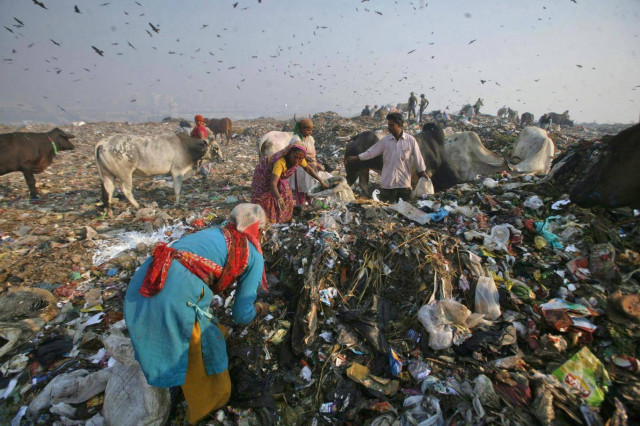Despite state-level bans, plastic bags still suffocate India's cities
Behaviour change through mass awareness is imperative

Waste collectors search for recyclable material at the Ghazipur landfill in New Delhi. PHOTO: REUTERS
In mid-January, Indian-administered Jammu and Kashmir became the latest state to prohibit all polythene bags, in accordance with a ruling by its High Court.
Ban on sale of plastic bags in K-P challenged
It joins 17 other states and territories governed by New Delhi that have imposed a complete ban on the sale and use of plastic bags, including Madhya Pradesh and Punjab.
Five other states - Goa, Gujarat, Kerala, Odisha and West Bengal - have partial bans on the use of plastic bags around sites of religious, historical or natural importance, or during the pilgrimage season, according to data provided to the Thomson Reuters Foundation by India's Central Pollution Control Board.
Despite this, change is barely visible on the ground. In mountainous Jammu and Kashmir, for example, shopkeepers and vegetable sellers still pack goods in plastic carrier bags before handing them over to customers. "We have been hearing this for a long time - I don't think (the ban) is going to work," said Mohammad Yasin, who sells vegetables in Srinagar city's Zainakote area.
The government of Jammu and Kashmir had already banned bags made of polythene - a common form of plastic - with a thickness of less than 50 microns a year ago, but to little effect.
"It is not only up to us - the customers share major responsibility. They should carry their own reusable bags. If they do so, the ban will work," Yasin said.
More importantly, the country needs to stop making polythene, he added. Several other shopkeepers the Thomson Reuters Foundation spoke to agreed.
"If the government is serious about stopping the use of polythene, it should ban its manufacturing. That will force people to carry their own bags," said Abdul Rashid, a shopkeeper in Srinagar's commercial hub, Lal Chowk (Red Square).
India's plastics industry employs about 4 million people, and has more than 30,000 processing units, according to the India Brand Equity Foundation, set up by the government to promote "Made in India" products internationally.
Domestic consumption of plastic is expected to reach 20 million metric tonnes per year by 2020, while exports of plastic products were worth $7.64 billion in 2015-16.
Weak Enforcement
Srinagar Deputy Commissioner Syed Abid said the Jammu and Kashmir government was committed to stamping out plastic bags.
"We have constituted special squads for enforcing the ban, and we are also seizing polythene wherever we find it in use," he said in an interview.
Balochistan bans use of plastic bags
Some environmental experts say carrying plastic bags should be punishable by law. "
As of now, only the traders or shopkeepers are penalised - which doesn't affect people who compel the shopkeepers to provide them with plastic bags," said Samiullah Bhat, assistant professor in the environmental science department at the University of Kashmir.
Riyaz Ahmad Wani, the commissioner of Srinagar Municipal Corporation, told the Thomson Reuters Foundation the authority may consider imposing fines on those who carry polythene bags under a new policy for solid waste management now being drafted.
In March 2016, the Karnataka state government issued a circular stipulating that no one should use plastic products, including bags, banners, bunting, flags, plates, cups, spoons, cling film and table cloths.
It also said those items should not be manufactured, supplied, stored, transported, sold or distributed. Megha Shenoy, a fellow at the Bangalore-based Ashoka Trust for Research in Ecology and the Environment (ATREE), said the ban has had "some impact" there but enforcement is patchy.
Civil servants in several departments are tasked with putting it into practice, but proof of their work needs to be collected and verified independently, said Shenoy. Without such a system, responsibility gets shunted between departments, "leading to dilution of enforcement", she said.
Moreover, several political parties - including the ruling party - often use banners, bunting and other plastic products, as bureaucrats struggle to implement the rules, she added.
Humans, cows at risk
As far back as 2012, two Indian Supreme Court judges warned "the next generation will be threatened with something more serious than the atom bomb" in the absence of "a total ban on plastic." But progress towards that aspiration is slow.
A 2015 report by the Central Pollution Control Board said Indian cities produced more than 15,000 tonnes of plastic waste every day. Of this, 9,000 tonnes were collected and processed, while the rest littered the streets and drains, or was dumped in landfill. About two-thirds of the plastic waste was a mix of polythene bags and food packaging, mainly from residential areas, it said.
In 2016, Indian Prime Minister Narendra Modi noted that cows - a sacred animal for many Indians - were dying after consuming plastic, and urged those concerned about their welfare to stop it happening. According to a June 2017 study published in the journal
Nature Communications, 20 rivers - mostly in Asia - carry into the sea about two-thirds of the plastic in the world's oceans, with the River Ganges crossing India and Bangladesh responsible for the second-highest amount among them.
Green alternatives
Swati Singh Sambyal, programme manager for environmental governance at the New Delhi-based Centre for Science and Environment, said a ban on plastic bags would only work if their manufacture was stopped and cheaper alternatives made available.
"A jute bag or a cloth bag is way beyond the reach of a vendor - only big malls or shops can use them," she said. Charging for polythene bags is another way to incentivise shoppers to bring reusable bags, while shopkeepers who give out plastic bags should be fined, she added.
Meanwhile, she urged cities to start information campaigns. "Behaviour change through mass awareness is imperative," she said, adding few efforts of this kind have been made so far.
Environmental pollution posing threat to lives
ATREE's Shenoy said citizens could help enforce the ban by using cameras on their smartphones and data collection apps, while the authorities should report publicly on progress.
The government could also support start-up businesses that offer sustainable alternatives to plastics, she added.
Some companies, for example, are making bags, bin liners and packaging from natural starch, vegetable oil derivatives and vegetable waste, which they say are biodegradable and non-toxic to flora and fauna, although they are still more expensive than their plastic equivalents.




1725099588-0/BeFunky-(41)1725099588-0-208x130.webp)














COMMENTS
Comments are moderated and generally will be posted if they are on-topic and not abusive.
For more information, please see our Comments FAQ